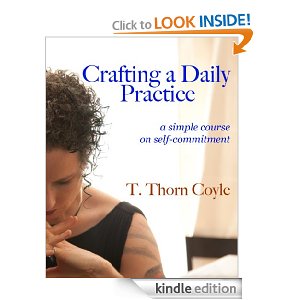by Kira Nuit
When I was pregnant, people often joked: “you’d better do all those things you’ve put off, because you won’t have time once the baby comes!” I thought they meant things like travel to Europe, play video games all night, or go out dancing. I didn’t realize the wisdom included things like cleaning house, any project requiring more than 10 minutes, or performing the regular spiritual tasks vital to my soul’s health. Fortunately, I dove into my spirituality during pregnancy and instinctively established some practices before the baby was born. I was thus able to adapt to a spiritual life with a newborn in tow. You may benefit from doing the same.
1. Craft a Daily Practice
Many years ago T. Thorn Coyle introduced me to the idea of daily practice for Pagans (for more, see this book. A daily practice makes a strong foundation, and I’ve never needed a stronger foundation than when I entered parenthood. Pregnancy can be a heady and magickal time for both parents; it’s wonderful to do all the meditations, energy work, purifications, and visualizations one has the time and desire to perform. Utilize the liminal, creative energy of pregnancy to catalyze your existing spiritual habits, or start new ones. Be decadent and greedy with this time, because it may be years before you again sit at your altar for long periods.
 In addition to starting or deepening an existing daily practice, I advise you to think about what exercises/rituals/meditations are most important to you. When you have an infant in arms, you may only have the time or energy to do one explicitly structured exercise a day. What will it be? Release the expectation that you will accomplish anything else and focus on the practice you find most important or fulfilling. Certainly this practice will change over time, but if you’ve already decided the one activity that is your priority then you can spend your energy figuring out how to do it around the baby’s needs, rather than wasting your precious free minutes trying to decide what to do.
In addition to starting or deepening an existing daily practice, I advise you to think about what exercises/rituals/meditations are most important to you. When you have an infant in arms, you may only have the time or energy to do one explicitly structured exercise a day. What will it be? Release the expectation that you will accomplish anything else and focus on the practice you find most important or fulfilling. Certainly this practice will change over time, but if you’ve already decided the one activity that is your priority then you can spend your energy figuring out how to do it around the baby’s needs, rather than wasting your precious free minutes trying to decide what to do.
2. Develop Short Forms
We all have our favorite lengthy exercises and rituals. Rather than giving them up after the baby is born, or putting them off until you can carve out the time to do them formally, create short forms. For example, I have a long prayer I like to do, complete with breath-work. It can take up to ten minutes. I can’t concentrate for ten minutes with an infant in my lap. However, the prayer culminates with four quick breaths; I can do that in most situations. So while I take the time for the long form whenever I can manage it, I perform the short form multiple times a day. I taught myself to find meaning and resonance in those four quick breaths and the accompanying prayer. Most exercises can be condensed to their key components and I think it’s better to do an abbreviated form with focus and attention than to find oneself waiting weeks for the perfect time to do the full ritual/exercise. I made the long form a part of me though months of repetition and attention and, through practice, the short form evokes the same energy.
3. Create Mental Triggers
The sleep deprivation of new parenthood causes one’s attention to alternate between profound moments of clarity and complete fuzzy-headedness. It’s hard to keep one’s footing. Even the structure of the day changes from week to week. These are the moments that we most want to remember, and they are so hard to miss. Buddhists use the minutiae of life as opportunities for mindfulness (“chop wood, carry water”), and we can too. While setting up your nursery space and imagining what life will be like with a baby, pick a task likely to repeat (washing/folding baby laundry, for instance), and set the intention to use it as an opportunity to bring your awareness into the present moment. Train yourself to rest in the sacredness of the universe when triggered by that task.
4. Apply Meaning to Repeated Tasks
In addition to using the repetition of life with a baby as a way to engender mindfulness, you can use the tasks as opportunities for quick practices or prayers. Let these tasks be the bedrock for a vibrant, living spirituality. For example, every time I changed a diaper I sent a prayer for the happiness of all beings. Every time I fed my child I sent a breath of gratitude for the abundance of sustenance in my life. When I washed my hands I prayed that obstacles be removed, from my path and from the paths of others.
5. Cultivate Alliances
 With childbirth and parenthood imminent, pregnancy may inspire you to seek out new entities with whom to share your new path. It’s best to begin those relationships when you have time to spend doing devotional practices, making offerings, or building alliances. It’s also a good time to prepare existing alliances for the inclusion of the baby.
With childbirth and parenthood imminent, pregnancy may inspire you to seek out new entities with whom to share your new path. It’s best to begin those relationships when you have time to spend doing devotional practices, making offerings, or building alliances. It’s also a good time to prepare existing alliances for the inclusion of the baby.
If you have not begun an Ancestor practice, I encourage you to consider doing so. I write elsewhere about my difficulty approaching Ancestor work until I had a child. I wish I’d begun the work during pregnancy, when I had more time to focus on such things. I now find it a vital and valuable practice, and love that my daughter and I have worked with the Ancestors since her infancy. (For more on Ancestor work, see Weaving Memory by Laura Patsouris.)
6. Baby-proof your Practice
Baby-proof your altar. Yes, some things will have to be packed away or moved to higher shelves; might as well take care of those tasks early on, so that your altar doesn’t become one of the things that has to change amidst all the other changes. Design an altar for use with an infant in arms, and be prepared to adapt it as your child grows. When my daughter was tiny, we sat and did candle-gazing together. Now the candle is out of reach, and everything on the altar can be touched. Soon I will be including my toddler’s sacred items with my own.
Baby-proof your rituals. I mean more than just make them safe: make them inclusive. Make your rituals a place where your infant or crawling babe can participate at his or her own level. Create ways to involve them in the magick. Let them sit in circle with you. There will be plenty of time later for private, complex adult magicks; take advantage of the early days to Work with your baby alongside you.
7. Start a Five-Year Diary
 Thankfully, this requires only a quick bit of preparation during pregnancy: purchase or make a five-year diary (I use Evernote for mine). Start writing while pregnant, and continue as long as desired. This is not a “journal,” where you pour out your thoughts and feelings for pages at a time. Instead, write a few sentences (or maybe a paragraph) about your day, jotting down the most important information. It’s a great way to track baby milestones, postpartum feelings, events, family dynamics, etc. A daily habit of penning a quick review keeps the days from melting together and allows you to spot patterns in your or the baby’s life. It also provides a fun snapshot when you arrive at the same day for the next year; you can look back and compare the current shape of your life to a previous one.
Thankfully, this requires only a quick bit of preparation during pregnancy: purchase or make a five-year diary (I use Evernote for mine). Start writing while pregnant, and continue as long as desired. This is not a “journal,” where you pour out your thoughts and feelings for pages at a time. Instead, write a few sentences (or maybe a paragraph) about your day, jotting down the most important information. It’s a great way to track baby milestones, postpartum feelings, events, family dynamics, etc. A daily habit of penning a quick review keeps the days from melting together and allows you to spot patterns in your or the baby’s life. It also provides a fun snapshot when you arrive at the same day for the next year; you can look back and compare the current shape of your life to a previous one.
I might not have managed to wash my hair more than twice a week during those early months, but I kept myself afloat through the changes, the emotions, and the exhaustion because I had my spiritual tools to hand, modified for new motherhood. I encourage you, whether you are the pregnant or the non-pregnant parent, to use those nine months to gestate strong and flexible spiritual habits for yourself.
Kira Nuit is a writer, geek, textile artist, witch and mother. She strives to build a simple and fulfilling life that integrates all her parts — which includes figuring out how to provide excellent care for her toddling daughter while also bathing regularly. She writes about it at Earth Mama Prime.
















